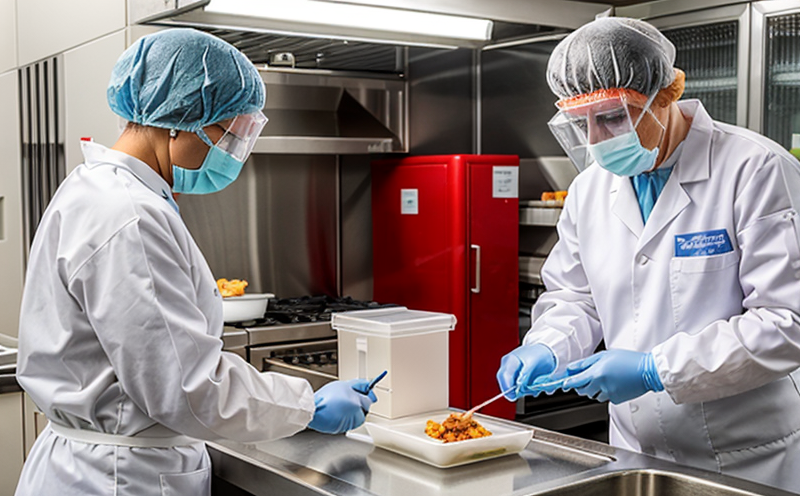ISO 20839 Detection of Rotavirus in Dairy and Infant Formula Products
The ISO 20839 standard outlines a comprehensive approach to detecting rotavirus, a significant cause of gastrointestinal illness, particularly in infants and young children. This service is crucial for ensuring the safety and quality of dairy and infant formula products. The testing process focuses on identifying the presence of rotavirus using advanced molecular techniques such as real-time PCR (polymerase chain reaction). Rotavirus is known to cause severe dehydration and can be fatal if not treated promptly, especially in infants and young children.
The importance of this service cannot be overstated, particularly for infant formula manufacturers. The World Health Organization (WHO) recommends exclusive breastfeeding up to six months; however, when breastfeeding is not possible, infant formulas are a critical alternative. Given the potential risk associated with rotavirus contamination, ensuring that these products are free from such pathogens is paramount.
The ISO 20839 method involves several steps, including sample collection and preparation, followed by nucleic acid extraction and amplification using real-time PCR technology. This technique allows for highly sensitive detection of the virus even in small quantities. The standard specifies detailed procedures to minimize cross-contamination risks during specimen handling and processing.
Rotavirus is a major public health concern, especially in developing countries where sanitation and hygiene standards may be lower. By adhering to ISO 20839 guidelines, laboratories ensure consistent and reliable results that help maintain the quality and safety of dairy and infant formula products.
One of the key aspects of this service is ensuring compliance with international regulations and industry best practices. The standard is regularly updated to reflect advancements in technology and understanding of viral pathogens. Laboratories performing these tests must stay abreast of these changes to provide accurate and up-to-date results.
The process begins with meticulous sample collection from dairy products or infant formula batches. Proper handling and transport are critical to avoid compromising the integrity of the samples. Once received at our laboratory, specimens undergo rigorous preparation steps which may include homogenization and filtration to ensure optimal extraction efficiency.
Nucleic acid extraction is a crucial step where DNA/RNA is isolated from the sample matrix. This process ensures that only pure rotavirus genetic material is used for subsequent amplification. Real-time PCR then detects even trace amounts of the virus by counting specific viral RNA sequences present in the sample.
The standard also emphasizes quality control measures and validation processes to ensure consistent results across different batches and laboratories. This includes using positive and negative controls during testing, calibrating instruments regularly, and implementing strict protocols for data interpretation.
Our laboratory adheres strictly to ISO 20839 standards, ensuring accurate detection of rotavirus in dairy and infant formula products. By leveraging our expertise and state-of-the-art facilities, we provide reliable test results that contribute significantly to maintaining product safety and compliance with international health regulations.
- Environmental and Sustainability Contributions:
- - Minimizing waste by reusing disposable materials where possible
- - Ensuring efficient use of resources through optimized sample processing
- - Contributing to public health by preventing the spread of rotavirus
- - Supporting infant nutrition and development by ensuring safe products
Applied Standards
The ISO 20839 standard is widely recognized for its rigorous approach to detecting rotavirus in various food products, including dairy and infant formula. This international standard provides detailed guidelines on sample preparation, nucleic acid extraction methods, amplification techniques using real-time PCR, and data interpretation.
By adhering strictly to these standards, our laboratory ensures that all tests are conducted under consistent conditions, leading to reliable and reproducible results. The standard is regularly updated based on scientific advancements and new information about rotavirus, ensuring that the testing methods remain cutting-edge.
The ISO 20839 methodology includes several key components:
- Sample collection from dairy products or infant formula batches
- Nucleic acid extraction to isolate viral RNA/DNA
- Real-time PCR amplification and detection of rotavirus
- Data interpretation and quality control measures
The standard specifies strict protocols for each step, ensuring that the testing process is thorough and accurate. This includes detailed instructions on sample handling, extraction efficiency optimization, and instrument calibration.
Compliance with ISO 20839 not only ensures high-quality results but also supports regulatory compliance requirements globally. Many countries and regions have adopted this standard as a benchmark for food safety testing, making it essential for manufacturers to ensure their products meet international standards.
The use of real-time PCR technology is particularly advantageous because it allows for rapid detection of rotavirus even in trace quantities. This ensures that contaminated batches are identified early, allowing for swift corrective actions and preventing potential health risks.
Our laboratory stays updated with the latest developments in this field to provide accurate and reliable testing services. By adhering strictly to ISO 20839 standards, we contribute significantly to maintaining public health and ensuring product safety.
Eurolab Advantages
At Eurolab, our commitment to excellence in food testing is reflected in the comprehensive services we offer, including ISO 20839 detection of rotavirus. Here are some key advantages that set us apart:
- Expertise and Experience: Our team consists of highly qualified professionals with extensive experience in molecular biology and food safety.
- State-of-the-Art Facilities: We operate cutting-edge laboratories equipped with the latest technology to ensure accurate and precise results.
- Comprehensive Quality Assurance: All our testing processes are rigorously quality-controlled, ensuring consistent reliability across different batches and samples.
- Regulatory Compliance: Our services align with international standards and regulations, providing peace of mind for clients seeking compliance assurance.
- Timely Reporting: Results are delivered promptly to ensure timely decision-making processes.
- Customer Support: Our dedicated customer service team is available to answer any queries and provide support throughout the testing process.
- Continuous Improvement: We regularly update our protocols based on the latest scientific research and industry best practices.
Our comprehensive approach ensures that clients receive accurate, reliable, and timely results, supporting their quality management systems and regulatory compliance efforts.





